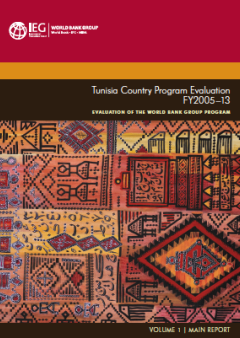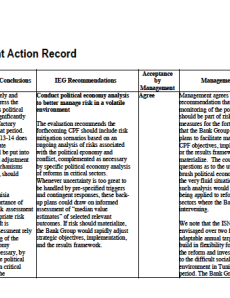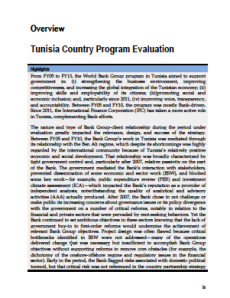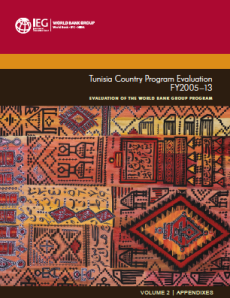
Tunisia Country Program Evaluation FY2005-13
The nature and type of Bank Group-client relationship during the period under evaluation greatly impacted the relevance, design, and success of the strategy. Between FY05 and FY10, the Bank Group's work in Tunisia was mediated through its relationship with the Ben Ali regime, which despite its shortcomings was highly regarded by the international community because of Tunisia's relatively positive economic and social development. That relationship was broadly characterized by tight government control and, particularly after 2007, relative passivity on the part of the Bank. The government mediated the Bank's interaction with stakeholders, prevented dissemination of some economic and sector work (ESW), and blocked some key work—for example, public expenditure review (PER) and investment climate assessment (ICA)—which impacted the Bank's reputation as a provider of independent analysis, notwithstanding the quality of analytical and advisory activities (AAA) actually produced. After 2007, the Bank chose to not challenge or make public its increasing concerns about governance issues or its policy divergence with the government on a number of critical reforms, notably in relation to the financial and private sectors that were pervaded by rent-seeking behaviors. Yet the Bank continued to set ambitious objectives in these sectors knowing that the lack of government buy-in to first-order reforms would undermine the achievement of relevant Bank Group objectives. Project design was often flawed because critical bottlenecks identified in ESW were not addressed—many of the operations delivered change that was necessary but insufficient to accomplish Bank Group objectives without supporting reforms to remove core obstacles (for example, the dichotomy of the onshore-offshore regime and regulatory issues in the financial sector). Early in the period, the Bank flagged risks associated with domestic political turmoil, but that critical risk was not referenced in the country partnership strategy (CPS FY10–13) that was terminated in January 2011 as a result of the revolution. The Bank's reticence may have been intended to keep business lines and dialogue open with a regime that had little need of Bank assistance, having attained investment grade status in 2007, but at a reputational cost. Overall, the outcome of the Bank program prior to 2011 is judged unsatisfactory.
Since 2011, the Bank Group has had a more robust relationship with authorities managing a difficult transition. The Bank responded rapidly to the interim government's request to help define and support priority socioeconomic actions (2011 Governance and Opportunity Development Policy Loan [GO DPL]). IFC ramped up its engagement with six new investments and provided advisory services designed to help implement critical reforms supported by Bank development policy lending (DPL). The Bank Group took a leading role in coordinating donors, worked closely with the International Monetary Fund (IMF), and strengthened its partnership base in Tunisia. Overall, the country team has been responsive in adjusting strategic direction and flexible in light of the evolving political context. All Bank operations explicitly include governance issues, particularly measures to increase voice, transparency, and accountability. The integration of gender into strategy and plans is one of the four guiding principles of the interim strategy note (ISN) FY12–13, although challenges persist in translating this aspiration into the design of specific measures. The use of multisector DPLs, underpinned by sound analysis, helped focus support, reinforce coordination across donors, and generate enhanced responsiveness to the government's needs. But improved streamlining and timetabling of measures would have been useful, particularly by mid-2012, when growing complexity and volatility in the political context was apparent. The Bank may have been overly optimistic in its assessment of the government's commitment to reform, which is not evident even at the time of this writing. The concept note for the second tranche of the Governance, Opportunity, and Jobs Development Policy Loan (GOJ DPL, September 2013) takes account of the very slow pace and poor quality of reforms and backtracks on initial optimism. The high quality development policy review (DPR) of October 2013 makes a strong case for the required elements of the reform agenda, and the Bank Group is now making strong efforts to reach out and inform (through TV and radio, for example) a broad range of stakeholders on required reforms. Relevance and design of the Bank Group program post-2011 is judged satisfactory.
The Independent Evaluation Group proposes a number of sequentially ordered recommendations to strengthen ongoing Bank Group efforts in Tunisia. First, the risk assessment exercise for the forthcoming CPS could usefully develop scenarios that take account of volatility in the political economy and allow for flexibility of response should risks materialize. Second, until the political situation stabilizes, the Bank could focus its efforts on galvanizing public support for reforms. For example, it could use the rich analysis of the 2013 DPR to help inform and build capacity among a broad base of stakeholders, such as trades unions, think tanks, civil society organizations (CSOs), and Parliament, to raise awareness and gradually build ownership of the reform agenda. Taking account of capacity and other constraints, the Bank Group could prioritize and sequence first-order policy reforms (that is, investment code, competition law, and labor market rigidities) while building government ownership and capacity on how to roll out the reform agenda.
See also:
- Tunisia Country Program Evaluation FY2005-13 Volume 2 (Appendixes)
- Tunisia Country Program Evaluation Overview
- Management Action Record



